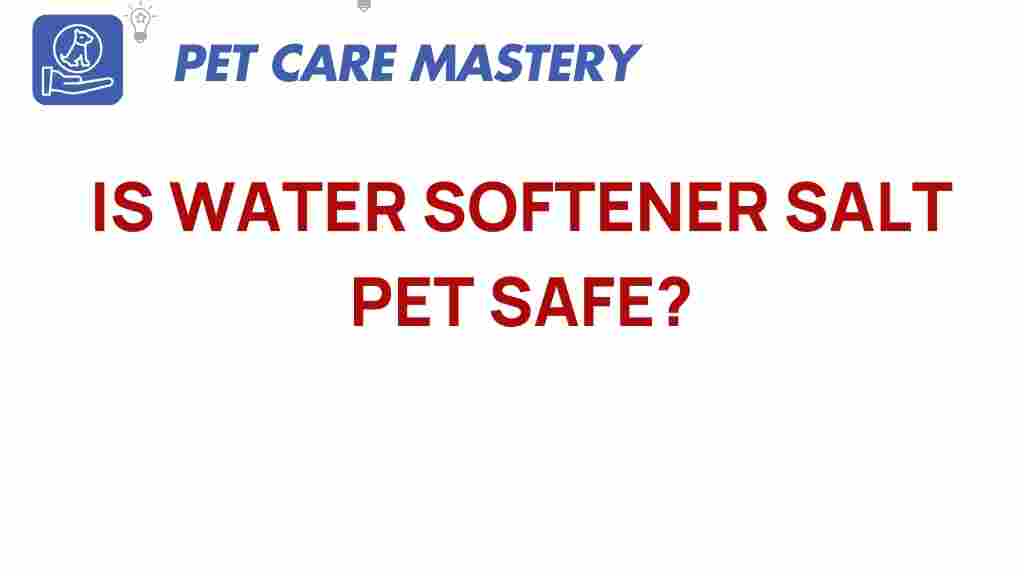Is Water Softener Salt Safe for Your Pets? Uncover the Facts!
As pet owners, we often go above and beyond to ensure the health and safety of our furry friends. One question that frequently arises is regarding the use of water softener salt in households with pets. Is it safe for them? This article aims to uncover the facts about water softener salt and its potential impact on your pets’ health.
Understanding Water Softener Salt
Water softener salt is a crucial component in the process of water softening, which is designed to remove hard minerals like calcium and magnesium from water. The most common types of water softener salt include:
- Halite (rock salt)
- Solar salt
- Evaporated salt
These salts work by exchanging sodium ions for the hard minerals, resulting in softened water that is more suitable for various household tasks, such as washing dishes and laundry. However, when it comes to pets, understanding the safety of these salts is essential.
Is Water Softener Salt Toxic to Pets?
The toxicity of water softener salt largely depends on the quantity ingested and the type of pet involved. Here are some key points to consider:
- Type of Salt: Most water softener salts are not inherently toxic. However, they can lead to health issues if consumed in large quantities.
- Sodium Intake: Pets, especially dogs and cats, have a recommended sodium intake. Excessive sodium can lead to health complications, including hypertension and kidney issues.
- Size of the Pet: Smaller pets are more susceptible to the effects of sodium toxicity due to their lower body weight.
What Happens If a Pet Ingests Water Softener Salt?
If a pet accidentally ingests a small amount of water softener salt, it may not cause immediate harm. However, ingestion of larger amounts can lead to various health issues, including:
- Vomiting
- Diarrhea
- Increased thirst and urination
- Weakness or lethargy
- Seizures in severe cases
It’s crucial to monitor your pet for any of these symptoms and consult a veterinarian if you suspect they have ingested a substantial amount of salt.
How to Keep Your Pets Safe from Water Softener Salt
While the direct toxicity of water softener salt may be low, it’s wise to take preventive measures to protect your pets. Here’s a step-by-step process to ensure their safety:
Step 1: Store Salt Securely
Keep your bags of water softener salt in a secure location, away from your pets’ reach. Consider using cabinets that pets cannot access.
Step 2: Clean Up Spills Immediately
If you accidentally spill any salt, clean it up promptly to avoid your pets ingesting it while exploring the area.
Step 3: Use Pet-Safe Alternatives
Consider using pet-safe water softening alternatives, such as:
- Potassium chloride
- Magnesium-based softeners
- Polymer-based softeners
These options can minimize the risk of sodium toxicity while still providing soft water for your home.
Step 4: Regular Veterinary Check-ups
Regular check-ups with your veterinarian can help ensure your pet remains healthy and monitor their sodium levels, especially if they have a history of health issues.
What to Do If Your Pet Shows Symptoms
If you notice any symptoms of sodium toxicity, follow these steps:
- Contact Your Veterinarian: Call your vet immediately for guidance.
- Provide Information: Be ready to inform your vet about the amount and type of salt ingested.
- Follow Instructions: Your vet may recommend bringing your pet in for examination or monitoring them at home.
Myths About Water Softener Salt and Pets
With any topic, myths can circulate. Let’s debunk some common misconceptions regarding water softener salt and pets:
- Myth 1: All water softener salts are poisonous.
Fact: Most salts are not toxic in small amounts, but large quantities can be harmful. - Myth 2: Pets can safely consume any type of salt.
Fact: Only specific types of salt are safe in moderation; always consult your vet. - Myth 3: Water softener salt does not affect pet health.
Fact: While not directly toxic, excessive sodium can lead to health problems.
Water Softener Salt and Other Pets
Different pets may react differently to water softener salt. Here’s a brief overview:
- Dogs: Generally more tolerant, but can suffer from sodium toxicity if large amounts are ingested.
- Cats: More susceptible than dogs; even small amounts can lead to health issues.
- Small Animals (e.g., rabbits, guinea pigs): Extremely sensitive to sodium; avoid exposure entirely.
Conclusion
In conclusion, while water softener salt is not inherently toxic to pets, it can pose health risks if ingested in large quantities. As responsible pet owners, it’s essential to be proactive in keeping our pets safe from potential hazards. Store salt securely, clean up spills, and consider safer alternatives whenever possible.
If you are ever in doubt about your pet’s health or safety, always consult with your veterinarian. For more information on pet safety and health, consider visiting the American Veterinary Medical Association.
For further reading on water softening methods and techniques, check out our article on water treatment options.
This article is in the category Products and created by PetCareMastery Team
